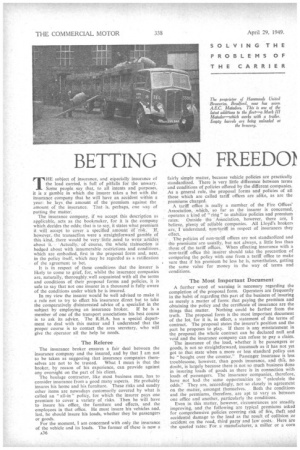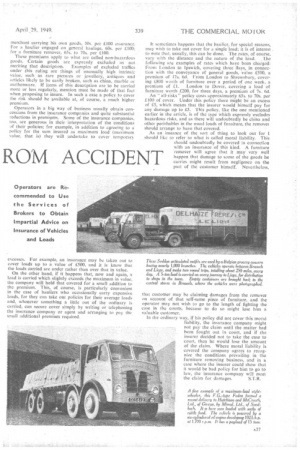BETTING ON FREED0/ ROM ACCIDEN
Page 24

Page 25

If you've noticed an error in this article please click here to report it so we can fix it.
THE HE subject of insurance, and especially insurance of the load carried, is full of pitfalls for the unwary. Some people say that, to all intents and purposes, it is a gamble in which the insurer takes a bet with the insurance company that he will have an accident within a year: he lays the amount of the 'premium against the amount of the insurance. That is, perhaps, one way of putting the matter.
The insurance company, if we accept this description as applicable, acts as the bookmaker, for it is the company which decides the odds; that is to say, it states what premium it will accept to cover a specified amount of "risk; If however, the transaction were a straightforward gamble of
this kind, there would be verylittle need to write articles
about it. Actually, of course, the whole tianiaatiOn is hedged about with innumerable resrrictions and conditions._ which are embodied, first in the proposal form and, next, in the policy itself, which may be regarded as a ratification of the agreement to bet.
It is in respect of these conditions that the insurer is likely to come to grief, for, whilst the insurance companies are, naturally, thoroughly.well acquainted with all the terms and conditions of their proposal forms and policies, it is safe to say that not one insurer in a thousand is fully aware of the conditions under which he is insured.
In my view the insurer would be well advised to make it a rule not to try to effect his insurance direct but to take the comparatively disinterested advice of a specialist in the
subject by employing an insurance broker. If he is a
member of one of the transport associations his best course is to ask its advice. The R.H.A. has a special department to deal with this matter and I understand that the proper course is to contact the area secretary, who will give the Operator all the help he needs.
, The Referee
The insurance broker ensures a fair deal between the insurance company and the insured, and by that I am not to be taken as suggesting that insurance companies them selves are not to be trusted. What I mean is that the broker, by reason of his experience, can provide against any oversight on the part of his client.
The haulage contractor, like most business men, has to consider insurance from a good many aspects. He probably insures his home and his furniture. These risks and sundry other items are nowadays customarily covered by what is called an " all-in" policy, for which the insurer pays one premium to cover a variety of risks. Then he will have to insure his office, the furniture and effects, and the employees in that office. He must insure his vehicles and, last, he should insure his loads, whether they be passengers or goods.
For the moment, I am concerned with only the insurance of the vehicle and its loads. The former of these is now a A36 fairly simple matter, because vehicle policies are practically standardized. There is very little difference between terms and conditions of policies offered by the different companies. As a general rule, the proposal forms and policies of all those which are called tariff offices are alike, as are the premiums charged. A tariff office is really a member of the Fire Offices' Association, .which, so far as the insurer is concerned, operates a kind of " ring " to stabilize policies and premium rates, Outside the Association, however, there are, I believe, plenty of reliable companies. All Lloyd's brokers are, I understand, non-'tariff in respect of insurances they effect., The policies of non-tariff offices arc not standardized and the premiums are usually, but not always, a little less than those of the tariff offices. When effecting insurance with a non-tariff office the insurer should take the precaution of comparing the policy with one from a tariff office to make sure that if his premium be less he is, nevertheless, getting the same value for money in the way of terms and conditions.
The Most Important Document
A further word of warning is necessary regarding the completion of the proposal form. Operators are frequently in the habit of regarding this part of the business of insuring as merely a matter of form: that paying the premium and obtaining the policy and the certificate of insurance are the things that matter. Nothing could be farther from the truth. The proposal form is the most important document of the lot, for it is, in effect, a statement of the terms of contract. The proposal states the insurer's position and the part he proposes to play. If there is any misstatement in the proposal the whole contract can be declared null and void and the insurance company can refuse to pay a claim.
The insurance of the load, whether it be passengers or goods, is not so straightforward, inasmuch as it has not yet got to that state when a more or less standard policy can be "bought over the counter." Passenger insurance is less troublesome, however, than goods insurance, and this, no doubt, is largely because there is not so much business 'done in insuring loads of goods as there is in connection with loads of passengers. The insurance companies, therefore, have not had the same opportunities to "calculate the odds." They are, accordingly, not so closely in agreement on the matter, amongst themselves. Both the conditions and the premiums, therefore, are apt to vary as between one office and another, particularly the conditions.
Even in this matter, however, circumstances are steadily improving, and the following are typical premiums asked for comprehensive policies covering risk of fire, theft and accidental damage to the load as the result of collision or accident on the road, third party and law costs. Here are the quoted rates: For a mantlea-cturer, a miller or a corn
merchant carrying his own goods, 30s, per £100 insurance. For a haulier engaged on general haulage, 60s. per £100; for a furniture remover, 65s. to 70s. per £100.
These premiums apply to what are called non-hazardous goods. Certain goods are expressly excluded as not meriting that deseription. Examples of excluded traffics under this ruling are things of unusually high intrinsic value, such as rare pictures or jewellery, antiques and articles likely to be easily broken, such as china, marble or earthenware. If items of this description are•to be carried more or less regularly, mention must be made of that fact when proposing to insure. In such a case a policy to cover the risk should be available at, of course, a much higher premium.
Operators in a big way of business usually obtain concessions from the insurance companies and quite substantial reductions in premiums. Some of the insurance companies, too, are generous in their interpretation of the conditions of their policies; for example, in addition to agreeing to a policy for the sum insured as maximum load (maximum value, that is) they will undertake to cover temporary excesses. For example, an insurance may he taken out to cover loads up to a value of £500, and it is know that the loads carried are under rather than over that in value.
On the other hand, if it happens that, now and again, a load is carried which slightly exceeds the maximum in value, the company will hold that covered for a small addition to the premium. This, of course, is particularly convenient in the case of hauliers who occasionally carry expensive loads, for they can take out policies for their average loads and, whenever something a little out of the ordinary is carried, can secure cover simply by writing or telephoning the insurance company or agent and arranging to pay the small additional premium required. It sometimes happens that the haulier, for special reasons, may wish to take out cover for a singleload; it is of interest . to note that, usually, this can be done. The rates, of course, vary with the distance and the nature of the load. . The following are examples of rates which have been charge'th From London to Ipswich, covering three hays, in connection with the conveyance of general goods, value £500, a premiuni of 17s. -6d. From London to Shrewsbury, covering £800 worth of furniture over a period of one week, a premium of it London to Dover, covering a load of furniture worth £200, for three days, a premium of 7s. 6d.
An "all-risks " policy costs approximately 65s. to 70s. per £100 of •cover. Linder this policy there might be an excess of ES, which means that the insurer would himself pay for any damage up to £5. This policy, like the one mentioned earlier in the article, is of the type which expressly excludes hazardous risks, and as there will undoubtedly be china and other perishables in the usual loads of furniture, the remover should arrange to have that covered. • As an instance of the sort of thing to look out for I should like to refer to what is called moral liability. This should undoubtedly be covered in connection with an insurance of this kind. A furniture
T remover will agree that it may very well happen that damage to some of the goods he carries might result from negligence on the part of the customer himself. Nevertheless,
that customer may be claiming damages from the remover on account of that self-same piece of furniture, and the operator may not wish to go to the length of fighting the case in the courts, because to do so might lose him a valuable customer.
In the ordinary way, if his policy did not cover this moral liability, the insurance company might not pay the claim until the matter had been fought out in court, and if the insurer decided not to take the case to court, then he would lose the amount of the claim. Where moral liability is covered the company agrees to recognize the conditions prevailing in the furniture removing business, and in a case where the insurer could show that it would be bad policy for him to go to law, the insurance company will meet the claim for damages. S.T. R.


























